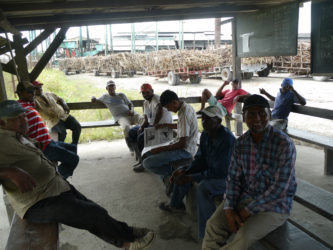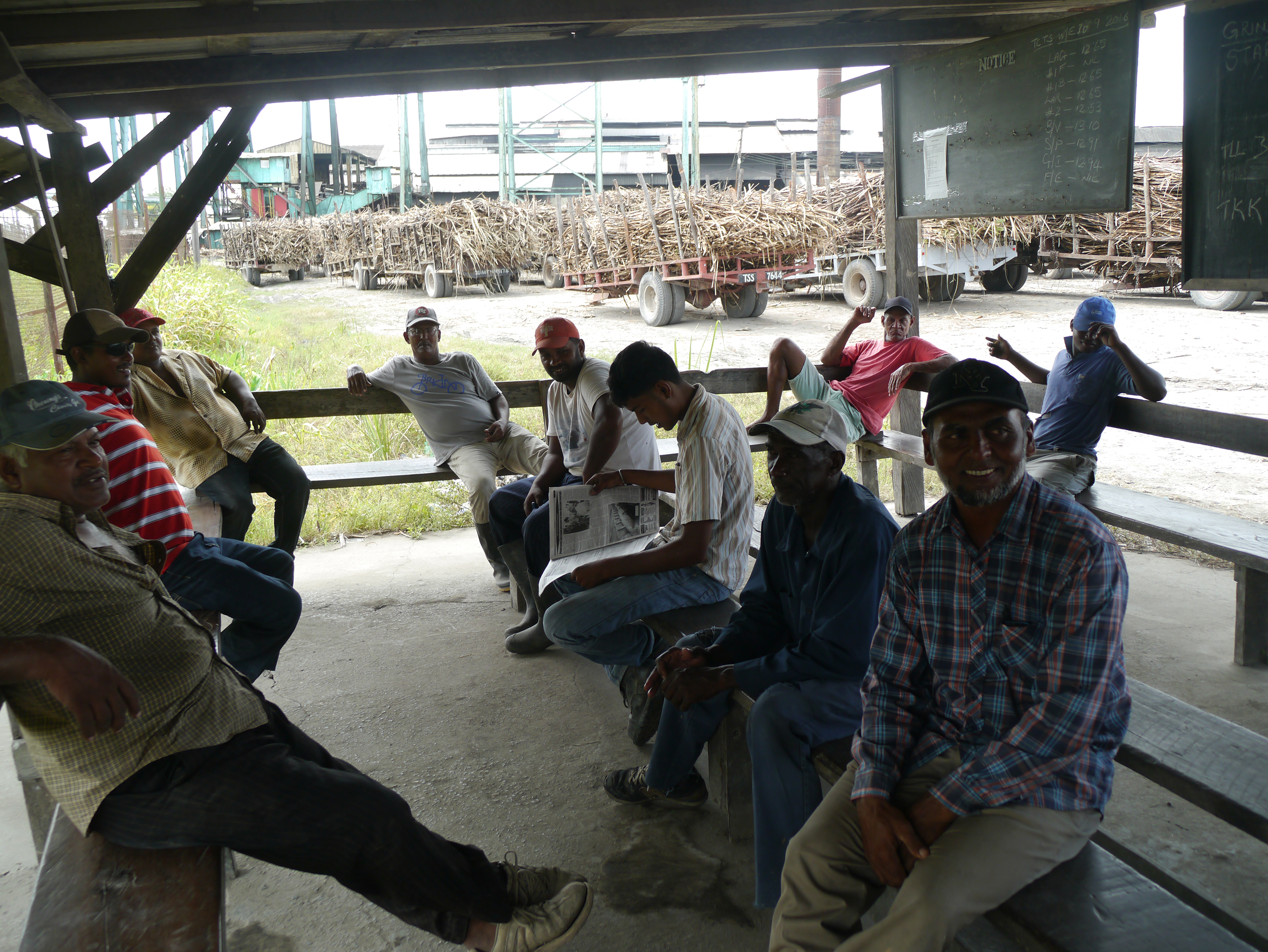As private cane farmers sat under a shed at the Wales Estate waiting for their cane to be discharged from trailers, they contemplated their future knowing that their main source of income is about to crumble.
The West Bank Demerara (WBD) estate will grind to a halt at the end of this crop and the farmers said when government made the announcement about the closure in January this year, it was a “big blow” to them.
Many of them “grew up in cane farming” and told Stabroek News that they were disappointed that they may no longer be able to continue the business that their families started several years ago.
The Guyana Sugar Corporation (GuySuCo) has given the farmers the option to transport their cane to the Uitvlugt estate but even so, they are not too optimistic.

The sugar entity had invited sealed bids last week through an advertisement in the state-owned newspaper, for infrastructural work for the transport of cane to Uitvlugt, West Coast Demerara. It was also seeking bids for the erection of a tractor and trailer park, roadway and reinforced concrete flat bridges at Uitvlugt estate.
But according to the farmers, it would cost them a lot to take their cane all the way there and some have already decided to get out of cane farming and invest in other crops.
Sam Persaud Knight, chairman of the Cane Farming Marketing Co-operative Societies, told Stabroek News that Keith Scott, Minister within the Ministry of Social Protection, with responsibility for co-operatives, met with several co-operatives from the West Bank on Monday last.
At the meeting, Knight highlighted the “very serious challenge” they face with the closure of the factory, the distance and the cost to take cane to Uitvlugt as well as the low price of $58,000 they were earning for a tonne of sugar.
He told Stabroek News that when the closure was announced, the farmers had a meeting with the estate and they formed a task force, which included farmers.
“They promised that the farmers would look at the aspects of the road and we went through the route and checked out if the possibility exists for us to have a proper all-weather road and where bridges are to be lowered and to be included,” he said.
He added that they also talked about “taking out turns and looking at what sections of the road would be widened.”
According to him, “All of a sudden we heard about another task force and that one doesn’t have farmers on it; just the estate personnel, and they brought back past managers… They went ahead and had a review of the route.”
Knight said too management informed them that according to a feasibility study, “beyond Number One Canal, [that is] in Canal Number Two, the cane is not enough to compensate for making the road…”
Farmers from Canal Number One backlands have taken some cane to Uitvlugt because it is closer.
He pointed out that they had a meeting with the Chairman of GuySuCo’s board Professor Clive Thomas and Agriculture Minister Noel Holder, who informed them that they would set aside $1 billion for the construction of the road.
However, he said, “Management is saying that cannot do the road so we don’t know where we are right now.”
Break even
He told this newspaper that the plan was to make the road to facilitate all of the farmers, “even those who use punts and would do double loading. But the punt farmers [from Belle Vue] are not too interested because of the price.”
He added: “You can hardly break even bringing the cane right here and to double load it from a punt to a trailer and then take it to Uitvlugt is like you’re just killing yourself.”
He pointed out that the “trailer farmers from Number Two Canal who were interested, are becoming discouraged now after they hear that [GuySuCo] would not be doing the road from there.”
Knight said they are currently “at a standstill and don’t know what to do. We just have to wait and see what is going on.”
He said farmers are willing to take the cane to Uitvlugt if there is an all-weather road and if the price goes up.
Besides, he said, sugar has to be “market driven” and he has to consider that before he thinks of continuing with cane farming, a business he has been doing for 25 years.
He said that while farmers were taking three loads to Wales, they would only be able to take one to Uitvlugt. He said the distance is about four times that of Wales and the fuel cost would be a lot more.
Wait-and-see
Right now he is on a wait-and-see before making a decision. “If shrimp has a better market, we may very well mind shrimp… We’re thinking about all other aspects [because] people have to eat. We can even get into partnership and do something. We can’t have the land idle. The food got to come from the land.”
Mohamed Khan, a farmer from La Grange, WBD said he does not know what the future holds for cane because of the infrastructural work that GuySuCo has to put in if they are to transport their cane to the Uitvlugt Estate.
He said the gantry and the scale have to be relocated to Uitvlugt but “farmers cannot wait” indefinitely “because that would probably take forever.”
According to the task force while this can be done during an out-of-crop period, when it was built originally, it took about six months. They believe that to dismantle, transport and reassemble at Uitvlugt would take longer than that.
On GuySuCo’s website, and advertisement “invited sealed bids from eligible and qualified bidders for the relocation of cane gantry, cane scale, feeder table and auxiliary carrier from Wales to Uitvlugt Factory.”
Khan said that at present, while he is reaping his cane he is ploughing the land to try his hand at rice farming for the first time. He said his land “can take rice because it is clay.”
Nevertheless, he too plans to “wait and see” and does not rule out getting back into sugar if the price increases.
Another farmer, Linden Vickerie, 54, of La Retraite, said, “The blow was so shocking, I can’t even decide what I would do yet. I am still off balance.”
Farming over 60 acres of land, he said he “grew up in sugar” and depended on it solely for a living. He is not planning to take his cane to Uitvlugt “for that low price” and said he would only do so if the price increases.
He pointed out that they were “already working at a loss and to go to Uitvlugt to transport cane would be much more costly, so it ain’t mek no sense.”
Migrate
Ganga (only name given), 33, of Canal Number Two, plants close to 100 acres of cane; he inherited the business from his parents. Frustrated with the state of the sugar industry, he said his only option would be to “stop planting cane and migrate.”
Farmers of the Belle Vue Cane Farmers Marketing Co-operative Society had told this newspaper in an interview earlier this year, that they were feeling like: “Alice in Wonderland” about their future.
Pointing out that GuySuCo would pay off the sugar workers, they asked, “But who would pay us? So many years we have supplied cane and now we have nothing to gain.”
They were at their wits end to find an alternative means of earning a livelihood as they don’t believe that taking cane to the Uitvlugt Estate would be feasible.
They were unsure about what would happen to the land as “There is no alternative. The lease is just to plant cane but we are hoping that they can give us permission to plant other crops.”







